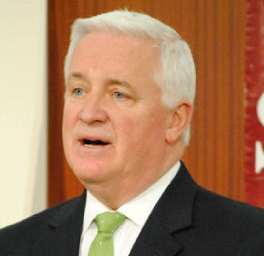Corbett says colleges could drill for cash
http://www.timesleader.com/news/Corbett_says_colleges_could_drill_for_cash_04-28-2011.html
Posted: April 29, 2011
Six of the 14 state campuses in Pennsylvania are located on Marcellus Shale formation.
EDINBORO — Some Pennsylvania universities should consider drilling for natural gas below campus to help solve their financial problems, Gov. Tom Corbett said Thursday.
The Erie Times-News reported that Corbett made the suggestion during an appearance at a meeting of the Pennsylvania Association of Councils of Trustees at Edinboro University.
Corbett said six of the 14 campuses in the Pennsylvania State System of Higher Education are located on the Marcellus Shale formation, part of a vast region of underground natural gas deposits that are currently being explored and extracted.
The Republican governor’s proposed budget for the fiscal year that starts in July would cut $2 billion from education and reduce aid to colleges and universities by 50 percent. The newspaper said Corbett emphasized the cuts are only proposals and that funding for education could change as he negotiates the budget with state lawmakers.
The Marcellus Shale formation lies primarily beneath Pennsylvania, New York, West Virginia and Ohio; Pennsylvania, however, is the center of activity, with more than 2,000 wells drilled in the past three years and many thousands more planned.
Drilling for gas in deep shale deposits is emerging as a major new source of energy that supporters say is homegrown, cheap and friendlier environmentally than coal or oil.
But shale drilling requires injecting huge volumes of water underground to help shatter the rock — a process called hydraulic fracturing. Some of that water returns to the surface, in addition to the gas, in the form of ultra-salty brine tainted with metals like barium and strontium, trace radioactivity and small amounts of toxic chemicals injected by the drilling companies.
Most big gas states require drillers to dump their wastewater into deep shafts drilled into the earth to prevent it from contaminating surface water. Although it has moved to limit it, Pennsylvania still allows hundreds of millions of gallons of the partially treated drilling wastewater to be discharged into rivers from which communities draw drinking water.

